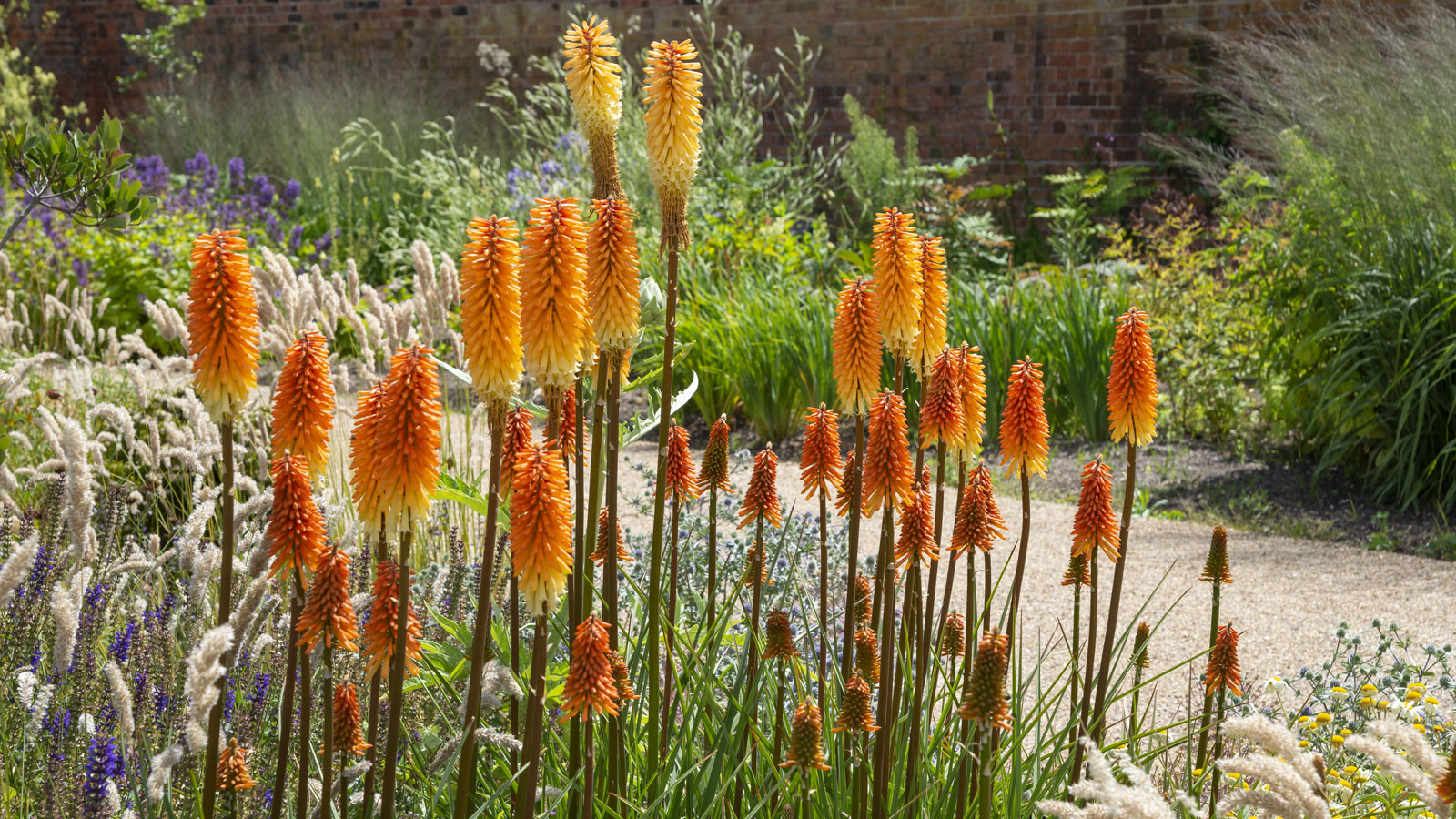
Make heat tolerant perennials the main event in your summer flower garden and it will look fabulous year after year with very little input from you as they're so low maintenance. This is particularly important if your summers are hot and arid, you're looking for options that help you conserve water, or you simply like the idea of plants that aren't needy.
The plants that can cope with hot conditions usually originate from hot and dry areas such as Florida, Texas and California. So if this is your locality, match your perennials to the conditions in your backyard and they will thrive. Use local native plants that are adapted to deal with the heat already and you'll have a better success rate.
The 10 best heat tolerant perennials
Perennials are worth the investment, blooming for years once established. So if you're looking for plants that won't shrivel up and die once the heat of summer sets in, check out our list. We promise that the more sun these beauties get the happier they'll be.
1. Daylily
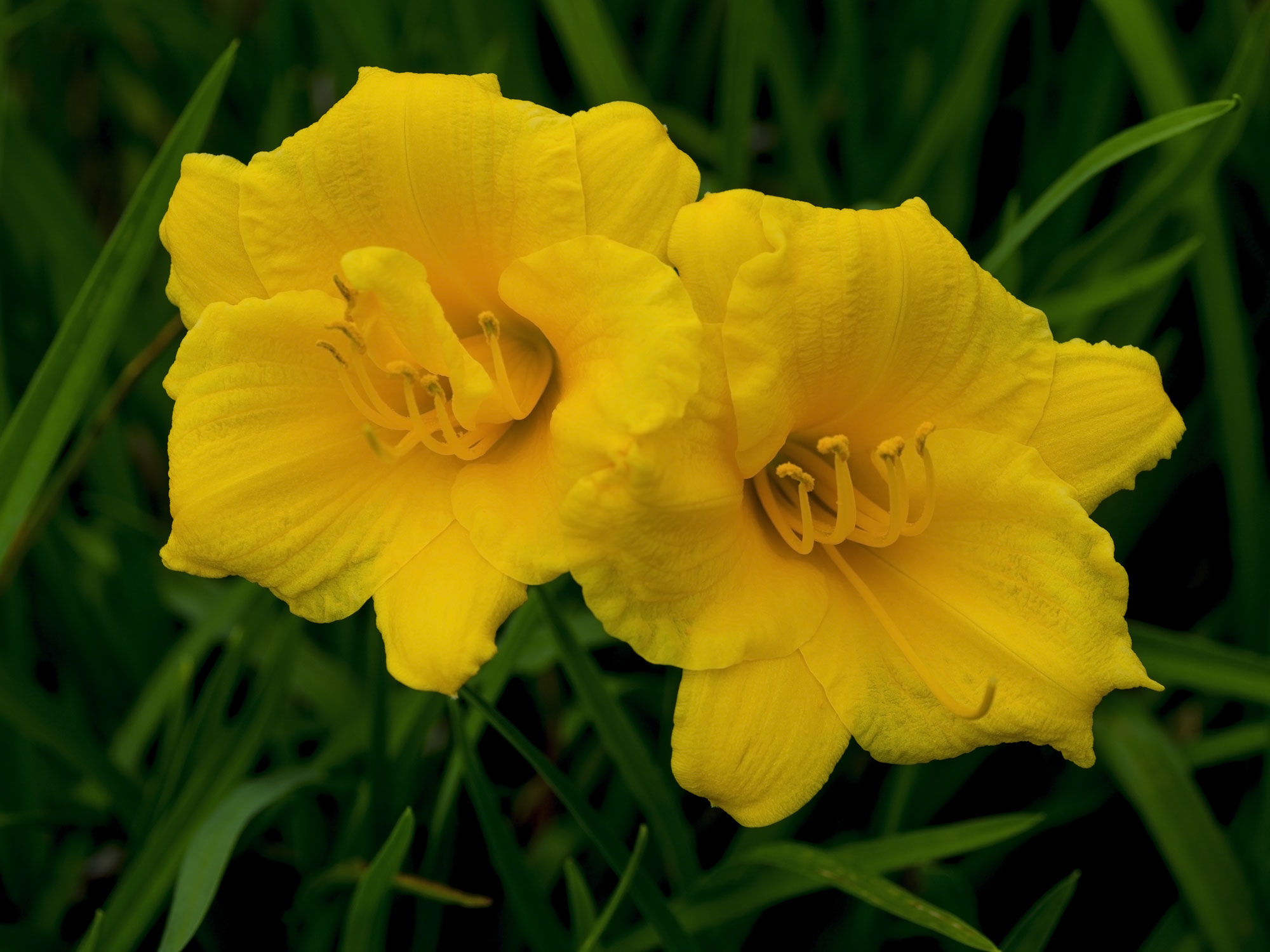
Daylilies are very much our kind of plants. They are tough, adaptable, and vigorous perennials that will bloom in your yard year after year with little or no care. They're not fussy about soil or light conditions either, survive winter, and will fill out a flower bed border after a couple of years. You can also divide them to get more plants.
Typically growing up to four feet high, each daylily plant produces masses of flower buds that open over a long period of time. There are many varieties, a wide range of sunset colors, and the flowers bloom throughout the heat of summer, which is naturally why they make it on to our heat tolerant perennials list.
There is one variety that experts particularly love. 'The 'Stella de Oro' is a low-maintenance plant that produces fragrant yellow flowers throughout the summer,' says Alex Kantor, owner at My Perfect Plants nursery in North Florida. 'Its trumpet-shaped flowers re-bloom longer than many other day lilies, making it a popular choice for landscaping. Its hardy nature and beautiful blooms mean Stella de Oro is much sought-after.'
2. Rudbeckia (Black-eye Susan)
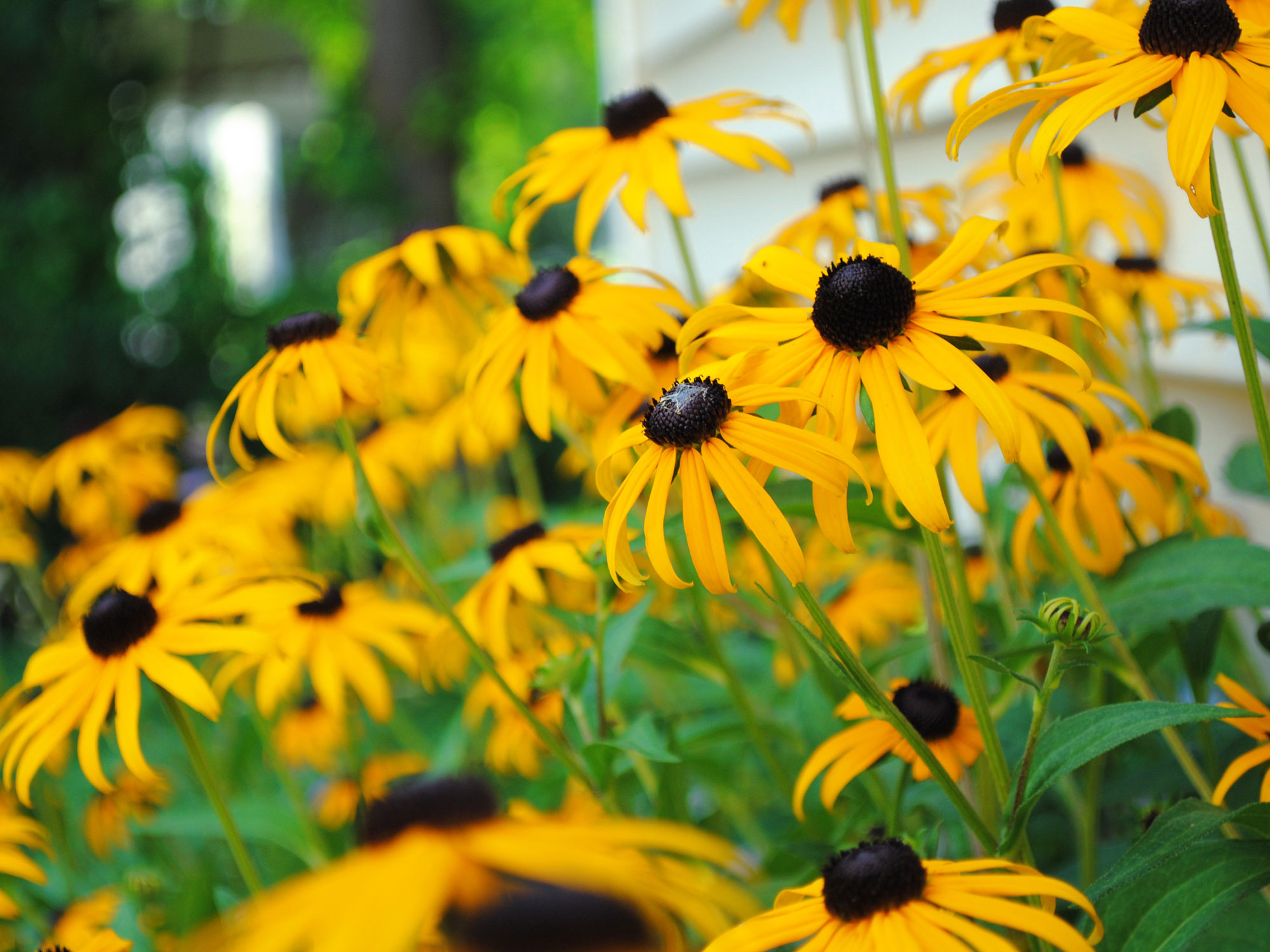
These gorgeous sunny summer flowers are a real favorite when it comes to heat tolerant perennials. They can handle hot temperatures and dry periods, making them a natural choice if you live in warm climate.
'This native flower is durable, extremely heat tolerant, and flowers all summer long,' says horticulturalist Gail Pabst, who works for the National Garden Bureau. 'It's one of the most popular perennials in North America. Plus, the're one of the best flowers for bees, butterflies, and other beneficial insects to your garden, helping to keep aphids, thrips, and whiteflies at bay. Additionally, birds will enjoy a snack of rudbeckia seeds in your backyard in the fall and winter.'
These are timeless flowers that bring a bright pop of yellow to the flower garden. The most popular variety is 'Goldsturm', while 'American Gold Rush' is a new favorite, adds Gail. 'It has bright, golden-yellow flowers with black centers and arched petals.'
3. Coreopsis

Known colloquially as 'tickseeds', these pretty daisy-like flowers produce masses of flowers right through summer and into fall. They are reliable and easy to grow, and the flowers are long-lasting. They mostly come in yellow and gold but you can also get pink varieties.
'These natives are the state wildflower for Florida and Mississippi,' says Gail Pabst. 'A perennial in the Asteraceae family that includes sunflowers, coreopsis is a pollinator magnet attracting bees and butterflies to their blossoms and birds to their seeds.'
Some of the shorter varieties like the hardy perennial 'Baby Gold' are good for containers. One of the most widely grown varieties is 'Early Sunrise', which is a good choice for dry gardens and rock gardens, as well as containers. 'This type has semi-double flowers that are about 2 inches across and are bright gold,' says Gail. Make sure you choose a hardy perennial type as some varieties of coreopsis are annuals.
Mature height and width: 18-20 inches tall and 20-24 inches wide
Price: $14.43
4. Yarrow (Achillea)
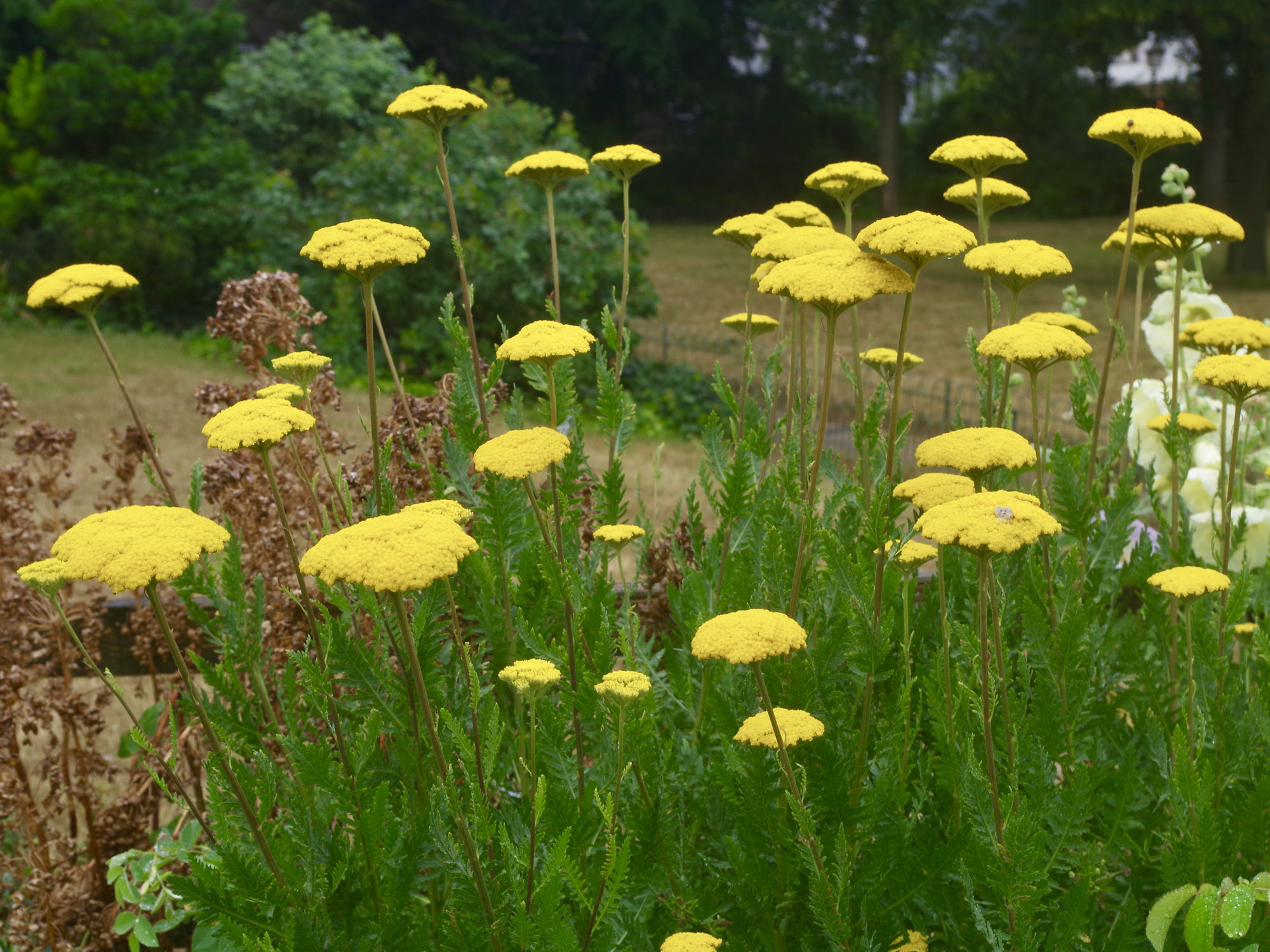
One of those plants that like full sun and heat, achillea is resilient during dry spells, and will flower even more abundantly if you water them a little throughout the summer months. The flattened shape of their textured flowers contrasts well with spiky red hot pokers and salvia in a mixed planting scheme.
'Yarrows all make extremely reliable, drought tolerant perennials that thrive in sunny areas with soils that drain well,' says horticulturalist Jenny Rose Carey, author of The Ultimate Flower Gardener's Guide. 'They are classic plants that add flat-topped, plate-shaped flowers to the late spring through summer garden.'
The fine textured leaves create a dense mat of foliage that spreads out and makes good ground cover too. Achillea can also be divided after a couple of years to get more plants.
5. Canna lily

Look at the combination of lush purple ribbed foliage and brilliantly-colored crested blooms of canna lilies and you just know they are going to be heat tolerant. These exotic lilies will add a tropical feel to patios, balconies and roof terraces, as the smallest cultivars will thrive in a large container. One of the best flowers for pots in full sun.
They come in every hot and zingy colorway going, including orange, yellow, purple and dark red, as well as cream or pink if you prefer something more subtle. You can also get stripy varieties. Bring one home from the garden center and plant it up while the weather is still cool, then just wait for things to hot up.
'They really start to shine when the heat of summer kicks in,' says Jenny Rose Carey. 'The cultivar 'Tropicanna' is one of the most well-known, with orange flowers, striped leaves and a red midrib. I grow 'Cleopatra' in a large pot and enjoy its multi-colored yellow and red flowers and irregularly patterned purple and green leaves.'
6. Coneflower (Echinacea)

Echinacea truly love baking in hot sun and are tolerant of summer dry spells too - easily one of the best plants for dry gardens. That said, they will bloom all the more prolifically with the occasional bit of watering. They come into bloom when other flowers are starting to fade and last right up to the first frosts, adding color and interest that lasts right into fall when they develop architectural seed heads that birds love.
'Echinacea are heroic summer flowers,' says horticulturalist Jac Semmler, author of Super Bloom. 'A true darling of a flower for our gardens and hearts. They are often known as coneflowers for their prominent center that pokes up like a rounded cone. The flowers have a real presence in the garden.'
There is also a huge range of colors and varieties to choose from. Echinacea come in all the orange, red and yellow sun-saturated shades as well as pink (such as the classic Echinacea purpurea) and cream, with single and double cultivars too, so you'll be sure to find what that works perfectly with the mood of your planting scheme.
7. Russian sage
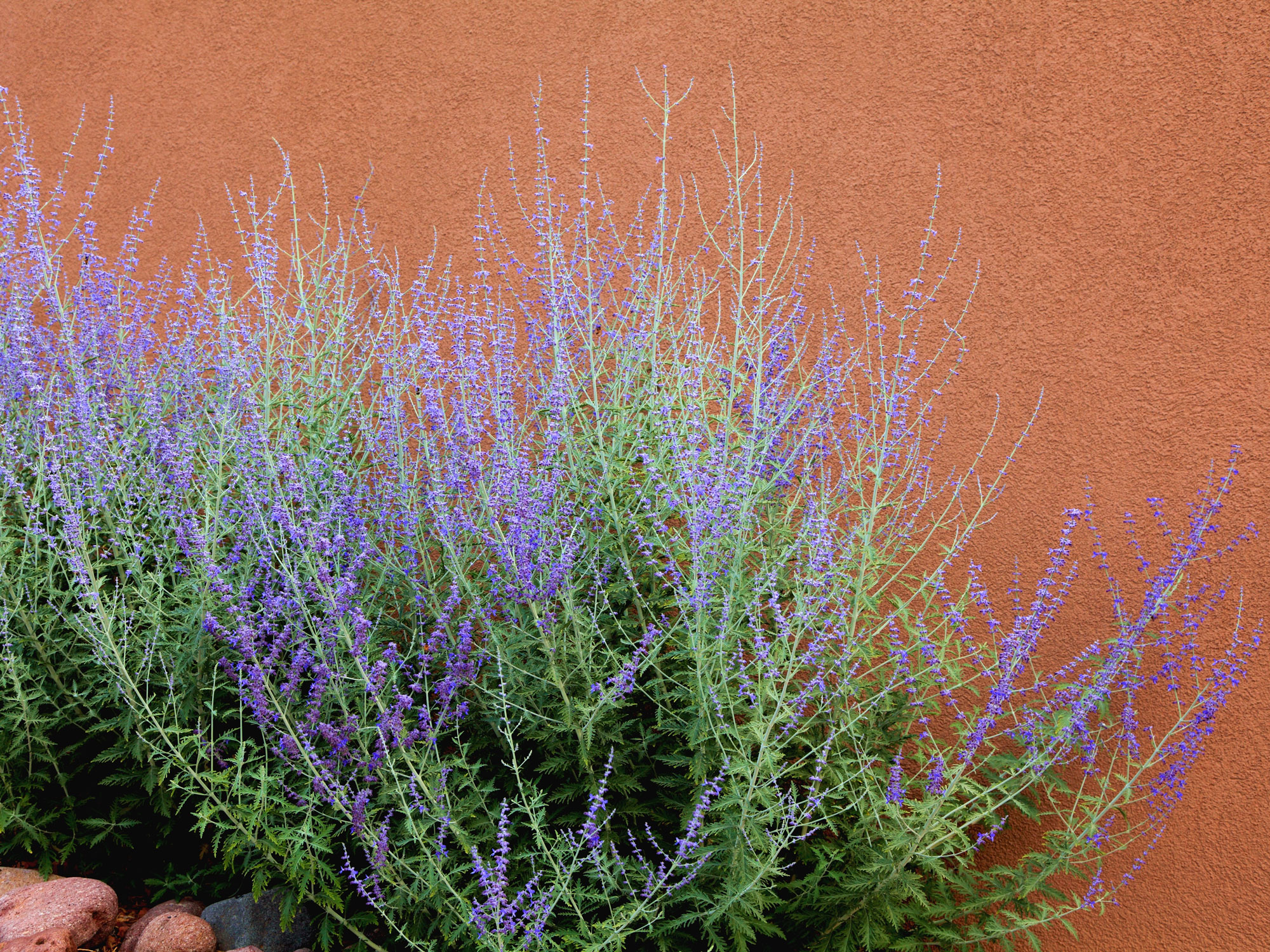
A highly aromatic plant with finely cut grey-green leaves, this is one of the best low-maintenance heat tolerant perennials if you want to add some blue to your planting scheme. Also known as Perovskia, it can take heat and drought, starts blooming in midsummer and lasts right until the first frost.
Russian sage is ideal if you have a small yard and want drought tolerant landscaping ideas. Make space to tuck in some of this compact perennial and you will be glad you did when it comes up again year after year. A word of warning - despite it's name, don't expect to add this to your herb garden. Its leaves are toxic if eaten.
'In midsummer the branching stems open into a multitude of small bright blue flowers, forming a very decorative light mass,' says Olivier Filippi, author of The Dry Gardening Handbook. 'The flowers are surrounded by velvety purple calyces, which remain on the flowering spikes for a long time after the flowers have fallen, extending the ornamental appearance of the plant through summer. It can be cut right down at the end of summer to encourage vigorous and floriferous new growth.'
8. Sedum

There are numerous species of sedum that will be of interest when you're choosing heat tolerant perennials for your yard, as they're one of the toughest plants you can pick. As well as sun loving and drought resistant, they are winter hardy too.
The classic variety is the upright soft pink 'Autumn Joy' with its soft pink flowers, but sedum also come in other colors, as well as ground cover options.
'Sedum palmeri forms a clump of light green leaves, marked with red in winter, says Olivier Filippi. 'It's an easily cultivated plant often grown in pots on balconies, where it needs minimal maintenance. It's appreciated for its abundant golden yellow spring flowering.'
If you have a green roof or are considering one, try adding sedum sediforme to the planting mix, advises Olivier. 'It's one of the most robust sedums, capable of surviving in very difficult conditions, for example on green roofs with a very thin layer of substrate.'
9. Turk's cap

If your yard or balcony is hot but shady we have the solution. 'Turk's cap (also known as Malvaviscus arboreus) is one of my favorite heat tolerant plants for shade or to plant en masse under a big oak tree,' says Amy Hovis, principal at Eden Design in Austin, Texas. 'This native perennial produces red tubular flowers that are irresistible to hummingbirds. It blooms from spring through fall, and is both cold hardy and drought tolerant.'
Native to the southeastern US, the bright-red, hibiscus-like flowers of this spreading perennial are also loved by butterflies, while birds love to feast on the berries that appear once the flowers fade at the end of summer. Although this ornamental plant prefers shade, it will adapt to full sun and dry soil too, so it is one of the most adaptable heat tolerant perennials.
It's worth pointing out how crucial it is to water any newly planted heat and drought-tolerant perennials until they establish a good root system. 'Some people assume that these plants will thrive right away, but giving them sufficient water while they get established is key to their long-term success,' advises Gail Pabst.
10. Kniphofia (red hot pokers)
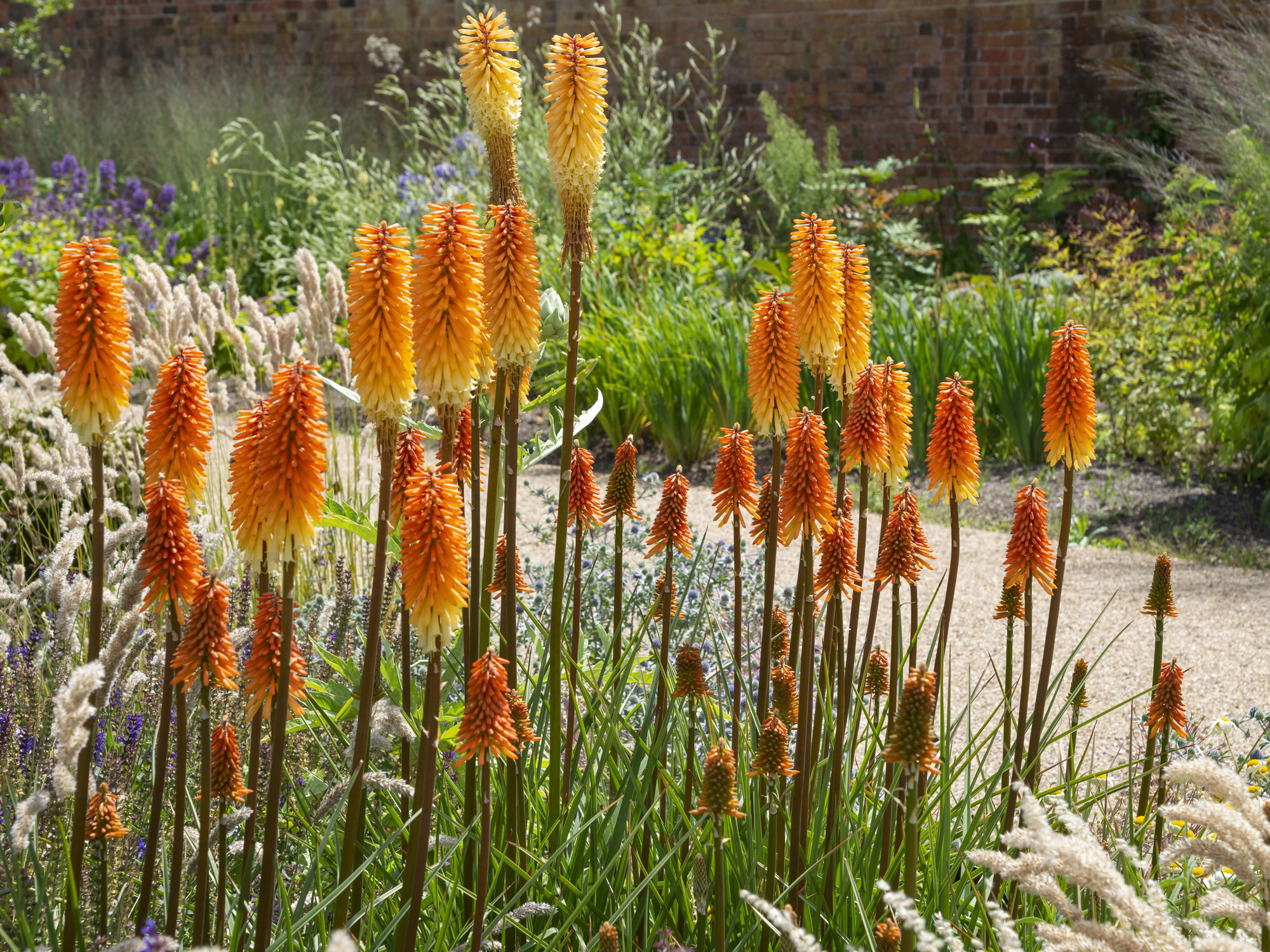
'My grandma delightfully referred to this upright flower as 'red hot pokers,' says Jac Semmler. 'They bloom in bright shades of yellow, orange and red so the name is a perfect description. But they also come in more unusual colors. I have a soft spot for the pastel yellow and lime varieties.' You can also get single color cultivars like the bright sulphur-yellow 'Brimstone'.
Plant kniphofia in full sun in a free-draining position, where they will be resilient for dry summer gardens once established. 'They are easily propagated by dividing the larger clump into several smaller pieces to share with garden friends,' says Jac.
Attractive to hummingbirds, you can also get dwarf varieties to pot up for patios and balcony gardens. Try Kniphofia triangularis, a compact little poker that grows to around 20 inches tall with slender spikes of pendulous orange flowers turning to red.







